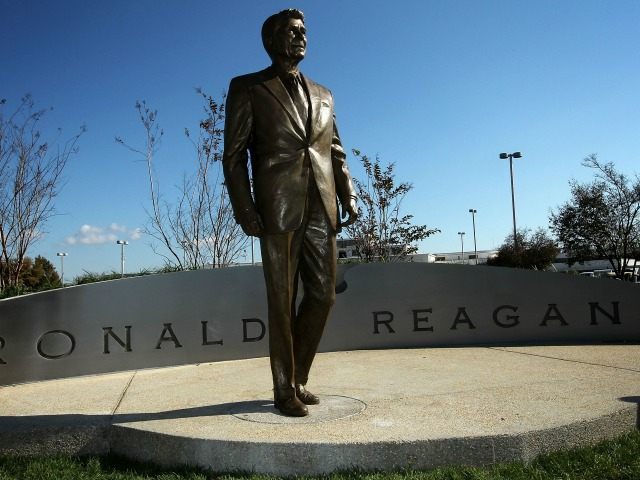On Breitbart News Daily, host and Breitbart News Executive Chairman Stephen K. Bannon interviewed historian Lee Edwards, who co-authored the recently released book A Brief History of the Cold War published by Regnery History. Edwards described how the Cold War was won and the lessons it draws for Americans today.
“We had great leadership, and we had great strategy. You have to have both of those things,” Edwards continued. “You have to have friends and allies. If you’re trying to burn bridges to old people they’ll build new bridges to allegedly new friends.”
Ronald Reagan understood this, Edwards said, and it was instrumental in achieving success at the end of the Cold War. It lead to victory “without firing a shot.”
Bannon and Edwards discussed how famed geopolitical strategist Henry Kissinger did not like Ronald Reagan, who he saw as dangerous. Edwards said the reason Kissinger disliked Reagan is because Reagan was so strongly anti-Communist, whereas Kissinger was the “apostle of accommodation, of detente, of going along to try to get along.”
Reagan moved away from this idea of detente with the Soviet Union and openly challenged them, according to Edwards. Reagan said before he became president that he had a very simple solution to winning the Cold War, “We win, and they lose.”
The strategy pivot away from accommodation to finding ways to defeat Communism allowed President Reagan to come up with new solutions to win the Cold War.
“For example, helping Solidarity in Poland. Such as, supporting freedom fighters in Nicaragua and Afghanistan. Such as going after Soviets and not allowing them, and working with allies to ensure, they could not sell natural gas,” Edwards said.
Edwards also explained how the Strategic Defense Initiative, dubbed “Star Wars,” was perhaps the most innovative solution to defeat the Soviet Union. The Soviets very quickly realized they could not match the American nuclear defense program. Russian leader Mikhail Gorbachev understood that the Soviet Union could not match the United States in an arms race and decided he needed to go to the “bargaining table” with Reagan, according to Edwards.
This was ultimately how the Cold War was won, but it provides useful lessons for future conflicts. Edwards described how the United States must have a overarching strategy about how to deal with a quickly rising, and increasingly militant China.

COMMENTS
Please let us know if you're having issues with commenting.